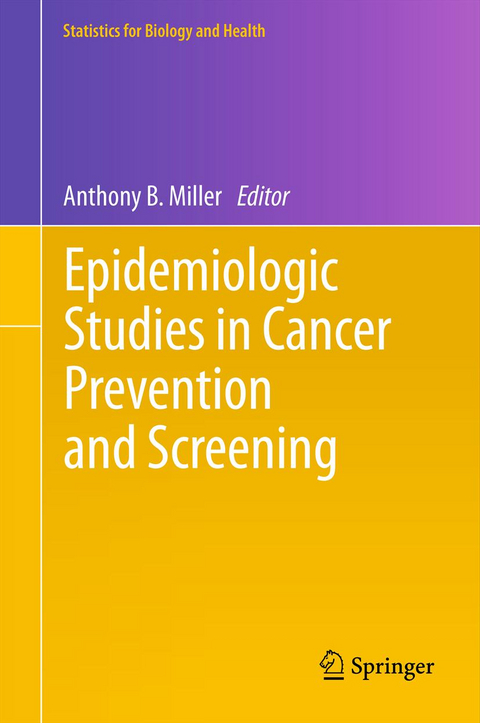
Epidemiologic Studies in Cancer Prevention and Screening
Springer-Verlag New York Inc.
978-1-4899-9259-8 (ISBN)
Epidemiologic Studies in Cancer Prevention and Screening is the first comprehensive overview of the evidence base for both cancer prevention and screening. This book is directed to the many professionals in government, academia, public health and health care who need up to date information on the potential for reducing the impact of cancer, including physicians, nurses, epidemiologists, and research scientists. The main aim of the book is to provide a realistic appraisal of the evidence for both cancer prevention and cancer screening. In addition, the book provides an accounting of the extent programs based on available knowledge have impacted populations. It does this through: 1. Presentation of a rigorous and realistic evaluation of the evidence for population-based interventions in prevention of and screening for cancer, with particular relevance to those believed to be applicable now, or on the cusp of application 2. Evaluation of the relative contributions of prevention and screening 3. Discussion of how, within the health systems with which the authors are familiar, prevention and screening for cancer can be enhanced.
Overview of the evidence base for cancer prevention and screening, as demonstrated in Epidemiologic Studies in Cancer Prevention and Screening, is critically important given current debates within the scientific community. Of the five components of cancer control, prevention, early detection (including screening) treatment, rehabilitation and palliative care, prevention is regarded as the most important. Yet the knowledge available to prevent many cancers is incomplete, and even if we know the main causal factors for a cancer, we often lack the understanding to put this knowledge into effect. Further, with the long natural history of most cancers, it could take many years to make an appreciable impact upon the incidence of the cancer. Because of these facts, many have come to believe that screening has the most potential for reduction of theburden of cancer. Yet, through trying to apply the knowledge gained on screening for cancer, the scientific community has recognized that screening can have major disadvantages and achieve little at substantial cost. This reduces the resources that are potentially available both for prevention and for treatment.
Anthony B. Miller is Professor Emeritus at the Dalla Lana School of Public Health.
Health promotion in cancer prevention.- Preventing cancer by ending tobacco use.- Prevention of occupationally-induced cancer.- The prospects for successful HPV vaccination for cervix and other cancers.- Prevention of cancers due to infection.- Applying physical activity in cancer prevention.- Cancer prevention in the United States.- The role of nutrition in cancer prevention.- Chemoprevention of cancer: from nutritional epidemiology to clinical trials.- The role of hormonal factors in cancer prevention.- Controlling environmental causes of cancer.- A historical moment: cancer prevention on the global health agenda.- Evidence-based cancer screening.- Comprehensive Cervical Cancer Control: Strategies and Guidelines.- Screening for cervical cancer.- Screening for colon polyps and cancer.- Screening for breast cancer.- Screening for prostate cancer.- Applying Cancer Screening in the context of a National Health Service.- Do international trends in cancer incidence and mortality reflect expectations from cancer prevention and screening?.- Using mathematical models to inform public policy for cancer prevention and screening.- Role of the oncologist in cancer prevention.- Integrating prevention and screening for lung cancer into clinical practice.- Early Detection of cancer in Asia (including Australasia).- Prevention and screening for cancer in primary health care.- What can we expect from cancer prevention and screening?.
| Reihe/Serie | Statistics for Biology and Health ; 79 |
|---|---|
| Zusatzinfo | XVI, 420 p. |
| Verlagsort | New York |
| Sprache | englisch |
| Maße | 155 x 235 mm |
| Themenwelt | Mathematik / Informatik ► Mathematik ► Wahrscheinlichkeit / Kombinatorik |
| Studium ► Querschnittsbereiche ► Epidemiologie / Med. Biometrie | |
| Schlagworte | Cancer Epidemiology • cancer prevention • Cancer Screening • Clinical Trials • Observational data • Regression Analysis |
| ISBN-10 | 1-4899-9259-6 / 1489992596 |
| ISBN-13 | 978-1-4899-9259-8 / 9781489992598 |
| Zustand | Neuware |
| Informationen gemäß Produktsicherheitsverordnung (GPSR) | |
| Haben Sie eine Frage zum Produkt? |
aus dem Bereich


